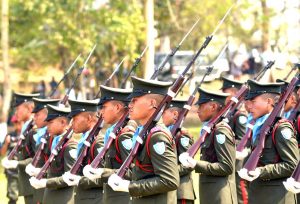Nagaland
‘Strategy changed from military to business approach’ – Kholi

Eastern Mirror Desk
Dimapur, March 21 (EMN): The Nationalist Socialist Council of Nagalim (NSCN, Isak-Muivah) celebrated its 39th republic day on March 21st at its council headquarters at Hebron near Dimapur.
The address of the organisation’s vice president, “retired general” Kholi Konyak, was given by the convener of the NSCN (IM) steering committee RH Raising.
In the address, Konyak said that the Indian leaders were not able to subdue the Nagas with ‘bullets’ and never stopped looking for ‘weaknesses or vulnerability’ in them.
“And so, they have changed their strategy from military approach to that of business oriented approach,” the vice president stated. Kholi added that the “Naga brothers could not stand before the enemies beguiled quantum of money and tinsel positions.”
The ongoing political issue of the Nagas is said to be one of the longest resistance movements in the world.
“It is a cause of aggression by India and the Nagas are the aggrieved,” Konyak stated. It mentioned that past leaders met with Mahatma Gandhi to solve the problem through dialogue. This was so because “Nagas trust in a democratic principle of settlement of dispute through mutual consent and agreement and that they are opposed to imposition of India’s will upon them, because imposition of one’s will upon the other has never solved problems anywhere in history; it only aggravates them,” it stated.
Also, Kholi Konyak said that ‘political articulation for recognition’ was needed and not just “knowing or shouting alone.”
Terming the “historic framework agreement” as the foundation of a new relationship between the government of India and the NSCN-IM, Kholi said it would “dispel” doubts and fears which had been “bundling up” for many years. “Betrayal to it will be an irreparable loss for both parties and the long cherished goal is now within our grasp,” he concluded.
Several representatives from civil organisations were also present at the function. The vice president of the Eastern Nagaland People’s Organization said in his message that money had become the “supreme power” in the society. “People in Nagaland are not supreme—money is the supreme power and it is a money-oriented society,” he asserted.
While apologising to the gathering if any sentiment was being hurt, the vice president termed the society a ‘spoilt society’ where “Nagas have started worshipping money.” He said this in regard to the recently concluded assembly elections during which even though the Nagaland Baptist Church Council had called for ‘clean’ elections, votes were still being bought at an ‘all-time high.’
“Naga system needs to change and people need to lift up the right leader for a big reconciliation and a big revival,” he said.
HK Zhimomi, a representative from the Naga Hoho said that the NSCN-IM had achieved a “tremendous deal” in signing the “framework agreement.” He added that the Naga Hoho was steadfastly supporting the ongoing peace talks hoping for a solution.
Representatives from other organisations and bodies such as the Naga People’s Movement for Human Rights, Rengma Naga People’s Committee, Eastern Naga Student’s Association, United Naga Council, Naga Student’s Federation, and the Tirap Changlang Longding Peoples Forum also gave short speeches on behalf of their organisations.
Hukavi Yepthomi, “kilo kilonser”, gave an account of the history of the Nagas’ struggle in their fight for freedom and rights of the people during the past seven decades. Claiming that the Indo-Naga issue was of political nature, Zhimomi said it cannot be solved through military means. This he said was in regard to the about five decades of intense conflict that caused “human suffering and pain.”
“The ongoing peace process is an opportunity to put right the unjust legacy of colonialism and restore the natural rights of the Nagas to determine their own future,” he said. He stressed on the uniqueness of the Nagas and claimed that the reason why they never accepted the Indian Constitution was due to the community’s “unique history and situation.”

